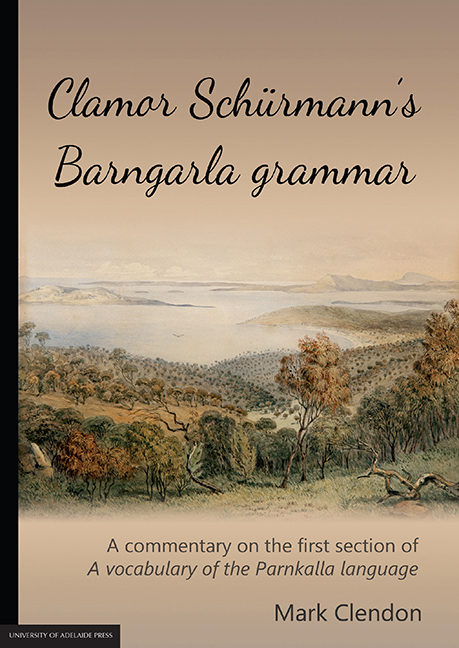 Clamor Schürmann's Barngarla grammar
Clamor Schürmann's Barngarla grammar Book contents
- Frontmatter
- Frontispiece
- Contents
- Abbreviations used in glossing sentence examples & in the text
- Preface
- Map: The northern and western Thura-Yura languages
- 1 Introduction
- 2 Writing Barngarla sounds
- 3 Pronouns
- 4 Intransitive verbs
- 5 Transitive verbs
- 6 Harry Crawford's Barngarla verbs
- 7 Suffixes on nouns
- 8 Other suffixes
- 9 Demonstrative & interrogative pronouns
- 10 Verbal derivational affixes
- 11 Non-finite verbs
- 12 Putting words together
- 13 Prospect
- Appendix The name Barngarla
- References
Appendix - The name Barngarla
Published online by Cambridge University Press: 05 February 2016
- Frontmatter
- Frontispiece
- Contents
- Abbreviations used in glossing sentence examples & in the text
- Preface
- Map: The northern and western Thura-Yura languages
- 1 Introduction
- 2 Writing Barngarla sounds
- 3 Pronouns
- 4 Intransitive verbs
- 5 Transitive verbs
- 6 Harry Crawford's Barngarla verbs
- 7 Suffixes on nouns
- 8 Other suffixes
- 9 Demonstrative & interrogative pronouns
- 10 Verbal derivational affixes
- 11 Non-finite verbs
- 12 Putting words together
- 13 Prospect
- Appendix The name Barngarla
- References
Summary
The phonological shape of the language name Schürmann transcribed as Parnkalla may be checked against recent recordings of this word. In Adnyamathanha the word occurs as Varngarla (Mcentee & McKenzie 1992: 56) showing retroflex nasal and lateral, although in 1960 O'Grady spelled the name Pankarla, (O'Grady 2001: 292), a representation he must have checked with Hale, who worked with Barngarla man Harry Crawford at Iron Knob on that occasion. Hercus & White (1973: 61) recorded the name as Baŋga?a, showing a velar nasal, as do maps drawn by Berndt and Tindale (reproduced in Hercus & Simpson 2001: 268-9), which have Banggala and Baŋga?a respectively. Tindale appears to have considered that Banggala was a valid alternative pronunciation1, and Hercus (1999: 12) treats this word as a northern dialect label. In view of Mcentee & McKenzie's Varngarla, and Crawford's Pankarla, a form Banggarla or something like it may have been a northern dialectal variant, or even an exonymic pronunciation.
Hercus & Simpson (2001: 271) discuss a possible etymology for the word Barngarla, incorporating kalla ‘voice, speech’, probably phonemic garla, corresponding to archaic Adnymathanha arlda ‘language’. The nineteenth-century settler AN Swiss spelled the word Parnkulta in a letter to RH Mathews (cited in Hercus & Simpson 2001: 271), supporting both the retroflex place of the nasal, as well as their proposed etymology. The language name was likely to have been phonemic /parnkarla/, at least around Port Lincoln. Swiss's spelling Parnkulta makes it fairly certain that this label variant, as Barnkarlda, reflects archaic Adnyamathanha arlda ‘language’ and Barngarla garla, or reconstructable early Thura-Yura *karlta ‘language’.
Simpson and Hercus (2001: 271, fn 11) point out that an initial element parn would be phonotactically illegal in Barngarla, so we may wish to look for an initial element parnga that might have formed parnga-garla* → parngarla. The Barngarla word parnga probably meant ‘hot, heat’ or similar. Schürmann lists a verb parnkata, phonemic barngadha, without a gloss but with a sentence example: ngalli parnkata/parnkalliti bukarranga ‘to be hot’. The verb parnkata occurs under another lemma with another sentence example, ngalli parnkata, again without a gloss. Under the lemma parnkata it looks as if an original printed sentence example ngalli parnkata has been overwritten by hand to read ngalli parnkalliti bukarranga.
- Type
- Chapter
- Information
- Clamor Schürmann's Barngarla grammarA commentary on the first section of A vocabulary of the Parnkalla language, pp. 173 - 174Publisher: The University of Adelaide PressPrint publication year: 2015


